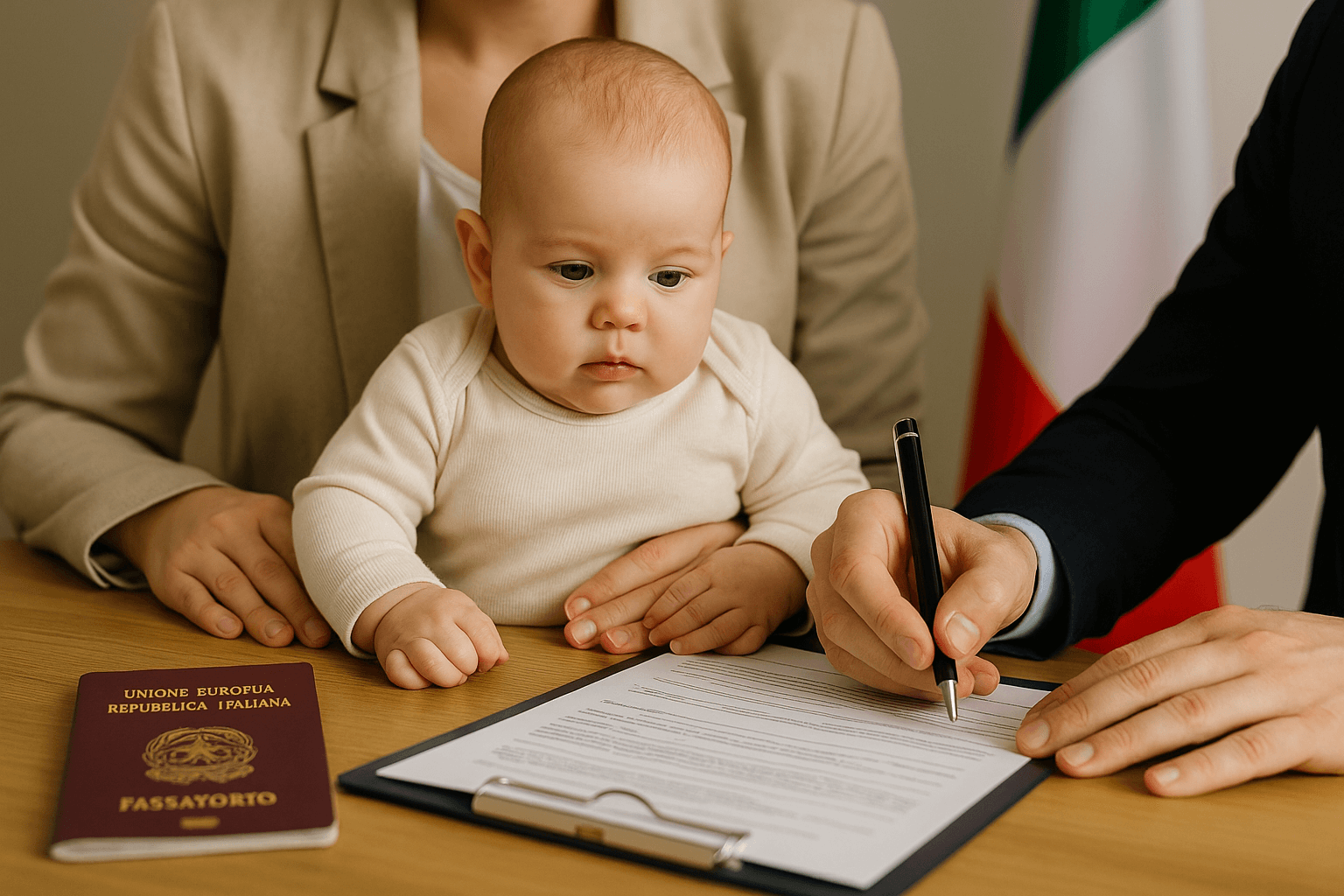An overview of (one) of the reforms introduced by the new Law 74 on Italian citizenship byy descent: art. 4 par. 1 Law 91/92
One of the most profound reforms introduced by the recent law 74/2025 on Italian citizenship by descent—often misunderstood or neglected in public commentary—is that children born abroad to an Italian citizen parent no longer gain citizenship automatically under the traditional jus sanguinis principle
Now, citizenship is by acquisition, this means obtained “per beneficio di legge” (by benefit of law), as laid out in the newly introduced Article 4, paragraph 1-bis Law 74/2025.
The article provides that a child born abroad who is a foreign national or stateless, and whose mother or father is an Italian citizen by birth, acquires Italian citizenship if the parents or legal guardian declare their intention for the child to acquire citizenship, and one of the following conditions is met:
a) After the declaration is made, the minor resides legally and continuously in Italy for at least two years;
b) The decaration is submitted within one year of the child’s birth or within one year from the date the parent-child relationship is legally established, including through adoption, with an Italian citizen
Italian nationality is no longer an inherent right at birth, but a status that must be actively obtained upon satisfaction of clear legal criteria.
Importantly, this status is not effective from the child’s birth, but only from the moment all the requirements are fulfilled,.
Misleading Notion: The “2026 Grace Period to Register Births”
Transitional provision of new law 74/2025 on Italian citizenship by descent provides a time window to register births of minors, up to May 31 2026.
Perhaps the most harmful misinterpertation of the new law is the belief that all minors can be registered up to May 31, 2026. This interpretation seems incorrect
That date seem to refer exclusively to a narrowly defined group of minors: those whose parents’ own Italian citizenship was only recently confirmed under the exceptions provided by the newly added Article 3-bis. That is:
- If Italian citizenship status was recognized, or the applicant received an appointment for application submission before March 27, 2025, 23:59 Rome’s time (art. 3 bis letter a)
- If citizenship was judicially confirmed following a claim filed before March 27, 2025, 23:59 Rome’s Time (art 3 bis letter a) bis)
- the status of citizen of the person concerned is judicially ascertained, in compliance with the legislation applicable on March 27, 2025, following a judicial application submitted no later than 23:59, Rome time, on the same date art (3 bis letter b)
In all other circumstances—especially where the parent’s Italian citizenship was already long established—the general rule found in Article 4, paragraph 1-bis, letter b) should apply.
As mentioned, according to this provision, the declaration must be filed within one year of the child’s birth, or within one year from the legal recognition of the parent-child relationship. Acting on the wrong assumption could lead to irreversible consequences, including forfeiting the right to citizenship altogether due to missed deadlines.
An interpretation of the Law 74/5
The law — which already raises several constitutional concerns (as discussed in our related article) — appears to exclude Italian citizens who were recognized many years ago. It effectively denies both them and their children access to the extended deadline provided under the transitional provision.
To understand why this interpretation, we need to look at the legislator’s very specific choice of words. There are two key rules:
- The General Rule (Art. 4, comma 1-bis): This rule applies to any minor child “of whom the father or mother are citizens by birth.” This is the broad, standard category. For these children, the parents must submit a “Declaration of Will” within one year of the child’s birth.
- The Transitional Rule (Art. 4, comma 1-ter(2)): This rule, which provides the May 31, 2026 deadline, applies only to minor children “of citizens by birth as per Article 3-bis, comma 1, letters a), a-bis), and b).”
This is the important distinction. The 2026 deadline seems to be a temporary remedy specifically for the children of parents whose own citizenship was only recently confirmed under the exceptions of the new law (i.e., those who met the March 27, 2025, application deadline).
There are several possible interpretations of this matter.
The one we have proposed is just one of them. However, we believe it is the most prudent and strategically sound because it relies on a strict, literal reading of the legal text — what is known in Italian law as the interpretazione letterale.
That said, this does not rule out the existence of alternative interpretations.
It is entirely possible that the view ultimately adopted by judges or public offices may differ — and could, in fact, be more flexible or favorable than this one.
We will have to wait and see – also how the Consulates will update the instructions on their website
The Requirement: A Formal In-Person “Declaration of Will”
Some simplified guides misleadingly advise parents to simply “get in touch with the consulate.” However, this oversimplification fails to mention the critical legal requirement now introduced by Article 4, paragraph 1-bis: a formal and joint “Dichiarazione di Volontà” (Declaration of Will) must be made by both parents.
This declaration is not a mere formality; it constitutes a legal act necessary for the application of the new citizenship regime. The Ministry’s interpretative Circular May 28 2025 provides explicit guidance on this point.
The Circolare clearly stats that such declarations: “must be formal and take place in person, in the presence of a delegate authorized to perform civil status functions“.
This clarifies that a physical appearance before an official is required, setting a much higher procedural threshold than a document sent by post or email. Relying on informal or incomplete procedures may result in the application being rejected on valid legal grounds—undermining any potential appeals or remedies.
Active Legal Planning
In the current legal framework, families must adopt a proactive legal strategy from the start.
That means:
- Drafting a Formal Application: Prepare a full legal submission that includes the Declaration of Will and explicitly requests an in-person appointment, as required by the Ministry’s Circular.
- Creating a “Data Certa” (Verifiable Date): Use legally traceable channels—PEC, registered mail, or personal delivery to the local Comune—to ensure there is certified proof that the process began within the mandatory one-year deadline. This protects families from potential administrative inaction or errors.
Conclusion
With this reform, what was once a birthright has become a conditional legal entitlement. The eligibility itself may still exist, but the process to claim it has become substantially more burdensome and time-sensitive.
FAQ – Italian Citizenship for Children Born Abroad (2025 Reform)
Do children born abroad to an Italian citizen parent still acquire citizenship automatically at birth?
No. Under the 2025 reform (Art. 4, comma 1-bis, Law 91/1992), children born abroad no longer acquire Italian citizenship automatically jure sanguinis. They must now fulfill specific legal conditions and a formal declaration must be made.
What does “by benefit of law” mean in the new citizenship rules?
It means that Italian citizenship is no longer granted as an automatic birthright, but must be acquired through a formal process, including a declaration of will and either residency in Italy or timely registration.
Who must make the declaration of will for a minor to acquire citizenship?
Both parents (or the legal guardian) must make a formal declaration (“Dichiarazione di Volontà”) in person, before an official authorized to perform civil status functions.
Who qualifies for the extended deadline until May 31, 2026
We mentioned ours is an interpretation of the Law 75/2025 and how it modified art. 4 Law 91/91. According to it, only minors whose parent’s Italian citizenship was recognized or formally applied for before March 27, 2025 at 23:59 (Rome time) — either via consular appointment, judicial claim, or court ruling under Art. 3-bis — qualify for the extended deadline; i.e. those parents whose own citizenship was only just confirmed thanks to the new decree’s exceptions. All others must comply with the standard 1-year rule.
What if I miss the one-year deadline? Can my child still acquire citizenship?
If you miss the deadline, you would need to explore the other legal pathways: after the declaration is made, the minor resides legally and continuously in Italy for at least two years.
How can I protect my child’s rights under the new law?
You should act proactively, submit a formal declaration, and create a verifiable date of application using certified methods (PEC, registered mail, or in-person submission).





